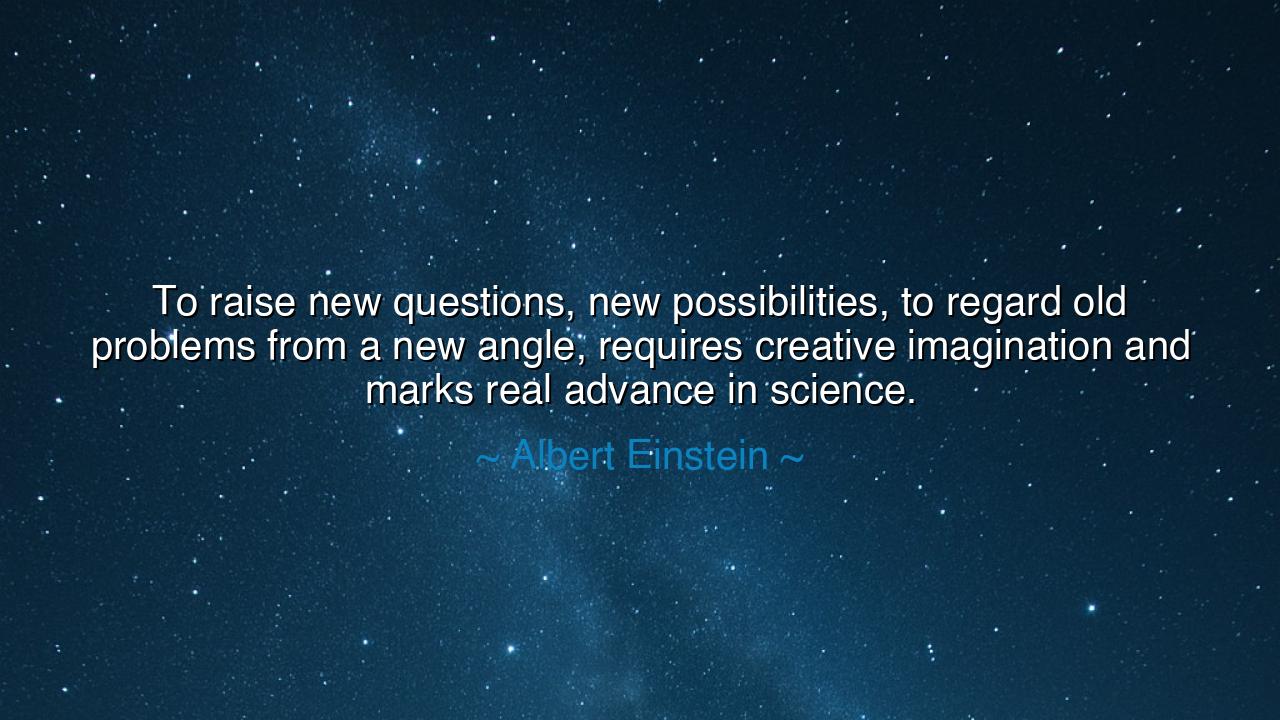
To raise new questions, new possibilities, to regard old problems
To raise new questions, new possibilities, to regard old problems from a new angle, requires creative imagination and marks real advance in science.






In the immortal words of Albert Einstein, the sage of modern science and the dreamer of the cosmos, we find a truth that transcends laboratories and formulas: “To raise new questions, new possibilities, to regard old problems from a new angle, requires creative imagination and marks real advance in science.” Within this declaration lies not merely a principle of discovery, but a philosophy of life itself. Einstein, whose mind unlocked the hidden rhythms of the universe, reminds us that knowledge alone is not the light of progress. It is imagination — that sacred flame within the human spirit — which transforms knowledge into wisdom, and curiosity into revelation.
For what is science without imagination? It is a body without breath, a machine without a dream. Facts, though powerful, are inert until the imagination stirs them to motion. The great advances of human thought have never come from the repetition of known truths, but from those rare and fearless moments when someone dared to ask a question no one else had thought to ask. Einstein, standing upon the threshold between physics and poetry, saw that true discovery is not the act of finding what we expect — it is the art of imagining what might be. To look upon the old with new eyes, to seek meaning in mystery — this, he said, is what marks the real advance of civilization.
The origin of this wisdom lies deep within Einstein’s own life. As a young man, he was not a scholar of privilege or prestige; he was a dreamer who worked in a patent office, his thoughts wandering through the invisible fabric of reality. There, among dusty files, his imagination soared beyond the confines of ordinary perception. He asked the unasked question: What would the world look like if I rode on a beam of light? From that single act of wonder, the theory of relativity was born — a vision that shattered the boundaries of Newton’s universe and remade humanity’s understanding of time, space, and energy. It was not his mastery of mathematics alone that made him a genius, but his creative imagination, daring to see the familiar from a divine new angle.
Consider the story of another visionary — Galileo Galilei, who centuries before Einstein turned his gaze to the heavens. The world of his time believed the Earth stood unmoving at the center of creation, encircled by the stars. But Galileo’s telescope, guided by his imagination, revealed a new truth — that the Earth was but one planet among many, adrift in a vast celestial sea. His question, though simple, was revolutionary: What if the heavens are not what we have been told? That question, born of creative imagination, changed the world. It cost him comfort, safety, and peace, but it gave humanity its first glimpse of the infinite. In this, he and Einstein are brothers across centuries — both daring to see not only what is, but what might be.
Einstein’s teaching is therefore both heroic and humbling. He warns us that the greatest obstacle to progress is not ignorance, but the illusion of knowledge — the belief that we already understand. When man clings too tightly to old facts, he imprisons himself in his own certainty. But when he allows his imagination to question, to dream, to play — the walls fall away, and new worlds are born. Thus, the true scientist is not a collector of data, but a seeker of wonder. He is not content with answers; he lives in the beauty of questions. And in this spirit, Einstein’s words become a call to all — not just the learned, but the living — to awaken the creative imagination that sleeps within the heart.
Even beyond the realm of science, this wisdom applies to every aspect of human endeavor. The artist, the philosopher, the teacher, the builder — all are bound by the same principle: that growth begins with the courage to see differently. To “raise new questions” is the act of rebirth itself — to look upon one’s life, one’s world, and say, There is more yet to be discovered. The imagination is the inner eye that perceives the possible within the impossible, the spark that transforms the ordinary into the divine. And without it, progress ceases, not only in science, but in the human soul.
So, my child, take this teaching into your heart: never fear to ask, never fear to dream. The universe does not yield its secrets to the complacent, but to those who wonder. When you stand before the old and familiar, do not merely accept it — question it. When faced with the unknown, do not retreat — imagine. For every great discovery begins with a single act of creative courage: the willingness to see differently. Let your imagination be your compass and your fire, and let your mind never grow weary of asking why.
And remember the eternal truth of Albert Einstein: that progress — in science, in art, in life — is not the triumph of certainty, but the victory of imagination over limitation. Facts may measure the universe, but only imagination can make it meaningful. Therefore, nurture your curiosity as you would a sacred flame, and know that every time you dare to dream a new question, you stand among the great architects of creation.






AAdministratorAdministrator
Welcome, honored guests. Please leave a comment, we will respond soon